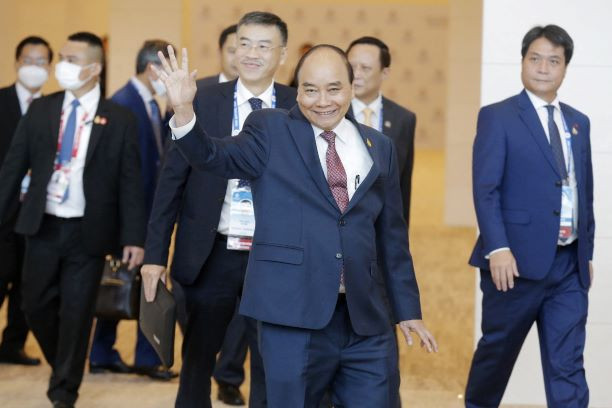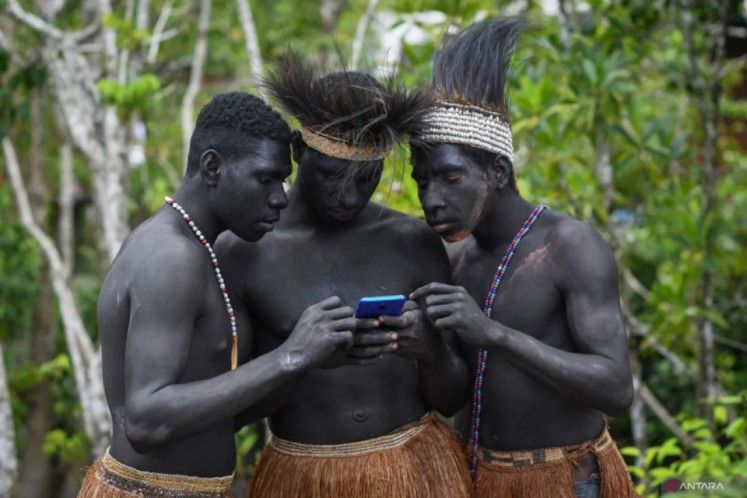Popular Reads
Top Results
Can't find what you're looking for?
View all search resultsPopular Reads
Top Results
Can't find what you're looking for?
View all search resultsVietnam’s national leadership struggle will impact ASEAN
The shocking replacement of president Phuc by the much younger female politician Vo Thi Anh Xuan as interim president indicates an attempt to accumulate power among Vietnamese Communist Party elite.
Change text size
Gift Premium Articles
to Anyone
 Prophetic wave: Vietnamese President Nguyen Xuan Phuc gestures as he arrives on Nov. 18, 2022 for the 29th Asia Pacific Economic Cooperation (APEC) Leaders’ Meeting during the APEC summit in Bangkok. Phuc resigned on Jan. 17, 2023 as Vietnam’s president amid a crackdown on corruption in the country. (AFP/Pool/Diego Azubel)
Prophetic wave: Vietnamese President Nguyen Xuan Phuc gestures as he arrives on Nov. 18, 2022 for the 29th Asia Pacific Economic Cooperation (APEC) Leaders’ Meeting during the APEC summit in Bangkok. Phuc resigned on Jan. 17, 2023 as Vietnam’s president amid a crackdown on corruption in the country. (AFP/Pool/Diego Azubel)
A
s the rotary chair of ASEAN this year, Indonesia will need to pay more attention to the ongoing political developments in Vietnam, whose political stability is crucial for the region given its steadily growing economy and international military stature. So far, at least for outsiders, there are no worrying signs from Hanoi amid the struggle for power among the political elite.
ASEAN was surprised by the sudden resignation of Vietnamese president Nguyen Xuan Phuc last week, amid an intensifying crackdown on corruption in the country. Only one month before he stepped down, Phuc held talks with President Joko “Jokowi” Widodo at Bogor Palace in West Java to seal the historic Natuna Waters Exclusive Economic Zone (EEZ) agreement between the two countries. Phuc was keen to leave a legacy that could serve as a model for peaceful border dispute settlement within ASEAN.
The agreement was historic, coming after 12 years of negotiation. Before reaching the final stage, the two countries had agreed on a continental shelf boundary in 2003, also after decades-long bilateral talks. Fishermen from both nations had often clashed in the disputed waters because of the overlapping claims.
China also insists it has the right to fish in the EEZ, based on its “nine-dash line” claim, which the international community does not recognize.
During the three-day state visit, Phuc and Jokowi also pledged to increase bilateral trade from the current US$12 billion to $15 billion in the next five years. For Indonesia, Vietnam is the strongest competitor in attracting foreign investment.
In terms of gross domestic product (GDP), Indonesia is the largest economy in ASEAN and the 16th largest in the world. Vietnam is third in the region, after Thailand.
The shocking replacement of president Phuc by the much younger female politician Vo Thi Anh Xuan as interim president indicates an attempt to accumulate power among Vietnamese Communist Party elite.
The 53-year-old Xuan will serve as acting president until an election is held in May. Under Phuc, Xuan served as vice president. It is unlikely, however, that Xuan will win the presidential seat in May amid the male-dominated politics of Vietnam.
Phuc’s early exit came amid large-scale party efforts to eliminate corruption. But in undemocratic countries, where political power is controlled by a few people, antigraft campaigns are often used to alienate political rivals.
International news agencies reported that 539 members of the Vietnamese Communist Party were prosecuted or "disciplined" for corruption or "deliberate wrongdoings" in 2022, including ministers, top officials and diplomats. Police have also investigated a record 453 corruption cases.
In terms of the economy, especially foreign direct investment, Indonesia should learn from Vietnam for its ability to provide a favorable climate to investors, including lucrative tax incentives and facilities, by eliminating as many hurdles as possible.
Vietnam’s GDP grew 8 percent last year, making it one of the world’s fastest-growing economies. Its inflation rate was only 3.85 percent. It recorded a trade account surplus of US$11.2 billion and its foreign direct investment disbursement rate grew 20 percent year-on-year. Its main investors were from Japan, China and South Korea, similar to Indonesia.
The Asian Development Bank (ADB) has predicted that Vietnam’s GDP growth will be about 6.3 percent this year, with inflation below 5 percent, amid concerns about a global recession.
In ASEAN, Thailand can pride itself as the only nation that was never colonized, while Indonesia was colonized by the Netherlands for 350 years and by Japan for 3.5 years before declaring its independence on Aug. 17, 1945.
Vietnam, however, is perhaps the only country in the world that can claim to have defeated three major powers: France, the United States and China. The US withdrew its troops from Vietnam in the 1970s after years of bloody war.
After the war, North and South Vietnam were unified on July 2, 1976. Saigon became Ho Chi Minh City and Hanoi became the capital of the new Socialist Republic of Vietnam.
China and Vietnam were involved in a border war in early 1979.
In 1978, Vietnam invaded Cambodia to topple the China-backed Khmer Rouge and install Hun Sen as Vietnam’s puppet leader of Cambodia. With the full support of Vietnam, Indonesia hosted years-long negotiations between Hun Sen on one side and the Khmer Rouge, King Sihanouk and a small nationalist camp on the other in Jakarta and Bogor.
After China assured Indonesia that it had abandoned its support for the Khmer Rouge, Indonesia and France hosted a meeting that resulted in the Paris Peace Agreement of 1991. Without strong support from Vietnam and the changes in China’s position, the prolonged civil war in Cambodia might not have ended.
Vietnam joined ASEAN in 1995. The founding members of the bloc, which was established on Aug. 8, 1967, were Indonesia, Thailand, Malaysia, Singapore and the Philippines. This year, Timor Leste is expected to become the group’s 11th member.
The strong determination of Vietnam to fight France, the US and China and, later, its big achievements in economic development confirm that ASEAN needs Vietnam as a source of inspiration and strength to build resilience and solidarity in the face of major powers competing for influence in Southeast Asia.
A politically stable Vietnam is instrumental in maintaining peace and stability in the region. We all hope that the party elite in Vietnam will find a win-win solution for the sake of the Vietnamese people, ASEAN and the world.
***
The writer is a senior editor at The Jakarta Post.










